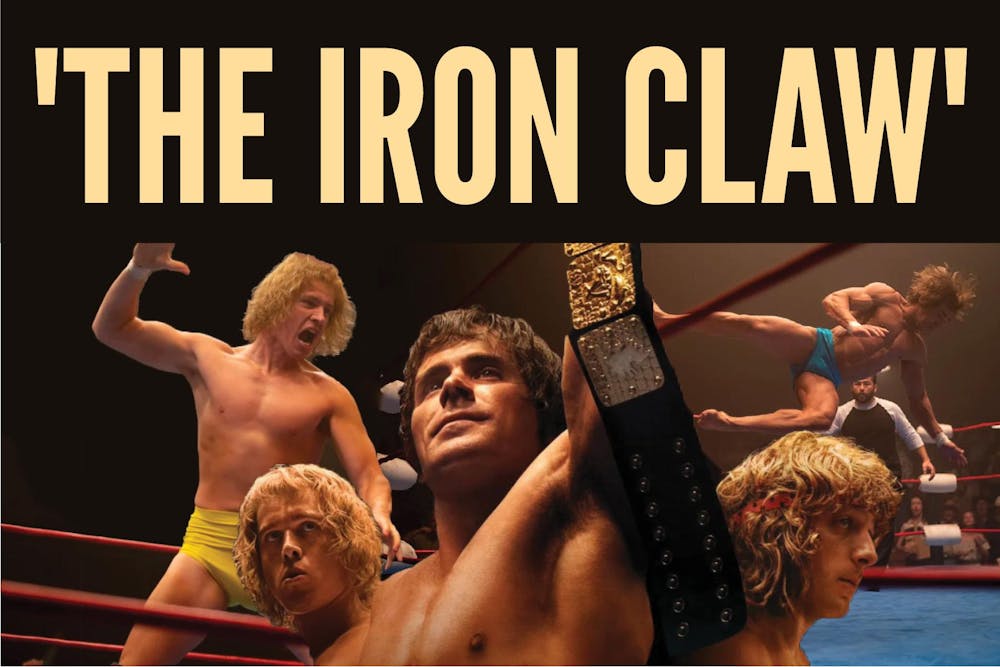A single contorted hand emerges, victorious, from the chaos of the wrestling ring.
NWA American Heavyweight Champion David Von Erich (Harris Dickinson) raises his hand into a claw above his head as a way to stroke fear into the enemy and to rile up the crowd — a twisted family crest for the Von Erich clan of wrestlers. The image doesn’t dissipate. This singular split-second frame from “The Iron Claw” is still frozen in my mind nearly a month after I saw the biography sports film with my younger brother in a theater on the Von Erichs’ very own Fort Worth turf.
The Iron Claw, a move popularized by professional wrestler and Von Erich patriarch Fritz Von Erich, requires a wrestler to put their palm on their opponent’s forehead and squeeze as hard as possible. This pressure is the signature hold of the Von Erich family. As it turns out, it is also the family curse that they cannot seem to escape.
“Pop tried to protect us with wrestling,” Kevin Von Erich (Zac Efron) says the in the opening scene of the movie. “If we were the toughest, the strongest, nothing could ever hurt us.”
As the film progresses, the audience witnesses the twisted irony in those lines. For a family that prides themselves on being fighters, they don’t realize they might be fighting something more metaphysical. Just because you’re a champion wrestler, it doesn’t necessarily mean you are equipped to fight the emotional battles happening within your heart and mind.
“The Iron Claw” is a deft look into masculinity and mental health through the lens of sports. As the film documents the rise and fall of the Von Erich wrestling family, it boldly asks the audience to question the ways in which we succumb to and break free from the vice grip of intergenerational trauma and toxic masculinity.
Wrestling, in particular, is a fantastic medium for exploring the connection between violence and toxic masculinity. So many men fight because they are not given the words to express themselves, but the fighting itself is never the problem. The film never demonizes wrestling. The Von Erich brothers are their happiest when they’re “just guys being dudes.” Rather, “The Iron Claw” argues that the macho mentality of wrestling culture — the one that sweeps mental health under the rug — is the thing that exacts the most emotional violence on the family.
The events of “The Iron Claw” take place in the 1970s and 80s, but the issues surrounding men’s mental health are still pertinent now. Even today, fighters are trying to challenge mental health stigmas.
“There’s a stigma in this world that men can’t talk,” UFC fighter Paddy Pimblett shouted into the mic after winning a fight in 2022. “I’d rather have my mate cry on my shoulder than go to his funeral next week.”
Pimblett’s friend had killed himself the morning of the match.
When my brother started quietly crying beside me in the movie theater, I pretended I didn’t notice. (Am I part of the problem?) I couldn’t help but think my brother was reminded of his own private battles while watching “The Iron Claw.” I know I was certainly reminded of all the men in my life who I cherish and all the struggles they have never mentioned to me. The film is about brotherhood, and I struggled to figure out how to be a good sister.
The male cast of “The Iron Claw” certainly deserves their roses, but in real life, Kevin Von Erich’s wife Pam Adkisson deserves the whole bouquet. “The Iron Claw” leads one to believe her love and support is a large reason why Kevin Von Erich is alive today. The main reason, though, is Kevin Von Erich’s choice to open up.
In a world where 40% of men say it would take suicidal thoughts for them to seek help, breaking down the stigma surrounding men’s mental health is a life-or-death situation. I assure you, when you finish the film and see the photo of Kevin Von Erich’s surviving and happy family, you will agree: It is not strength, but vulnerability that saves us.










